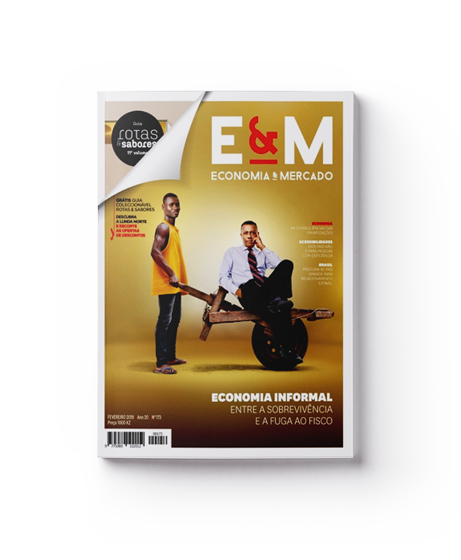Que avaliação faz do mercado da aviação?
O mercado da aviação, a nível internacional, está a enfrentar ainda grandes desafios, derivados do impacto que a Covid-19 causou. Isso cria também um grande desafio aos operadores aéreos de passageiros. O transporte de carga não foi tão afectado, mas, às vezes, isto passa despercebido. Os aviões também precisam de peças e de suporte técnico. As restrições de voos para determinados destinos limitam o acesso à logística de peças e, especialmente, para países como o nosso - que tem uma conectividade limitada, sem companhias como a Emirates a voar - ficamos com menos uma opção para o suporte logistíco eficiente.
Isso quer dizer que o aumento das restrições pode aumentar a quantidade de aeronaves em terra, por falta de manuentenção?
Por incrível que pareça, há países que estão a ter um impacto muito grande da pandemia, mas tomaram a decisão estratégica de não criar mais restrições à aviação, porque é uma indústria muito importante para as economias. Já estamos nesta situação da Covid-19 há dois anos, e muitos países, nem mesmo os Estados Unidos, não conseguem sobreviver com estes bloqueios. Estou, neste momento, nos Estados Unidos, e o que tenho visto é uma operação da aviação absolutamente normal. Os voos estão quase ao nível de 2019 e, pelo que foi decidido, não haverá mais retrições. Acho que é um exemplo que deveria ser seguido pelos governantes de outros países, porque, se continuarem com as restrições, daqui a pouco, não teremos indústria da aviação para recuperar, uma vez que as perdas na indústria são tão grandes, que será virtualmente impossível, a não ser que haja grandes subsídios dos Estados.
Olhando para os dados da ANAC, nota-se que em 2020 houve um período negro de três meses, em que as companhias não realizam voos. Qual foi o impacto desta paralisação na Bestfly?
O impacto em Angola foi brutal! Na Bestfly, felizmente, como empresa, conseguimos, de uma forma estratégica, posicionar-nos bem. Conseguimos circum-navegar na crise. Como somos fornecedores das indústrias fulcrais que suportam a economia do país, nomeadamente o Oil & Gas e o Mining, os nossos clientes precisaram de continuar a operar e de fazer os seus “cool change”, manter a operação para garantir a continuidade da exploração petrolífera e a exploração mineira. Isto permitiu-nos, a nível da Bestfly, manter a operação.
As operações da Bestfly não foram afectadas durante o longo período de confinamento, em 2020?
Conseguimos manter a operação. Não aos níveis de 2019, mas, no mínimo, de forma que o impacto que houve na Bestfly foi relativamente reduzido. Chegámos a estar no Aeroporto de Luanda como a única empresa que estava a operar, o que foi também uma opção nossa, no sentido de não aceitar a derrota da Covid-19. Uma empresa como a Bestfly, que é 100% privada, sem qualquer ajuda do Estado, teria grandes dificuldades de se recuperar.
De que forma essa situação afectou as operações?
Felizmente, como já tínhamos medidas de mitigação, conseguimos manter a operação sem alteração. Conseguimos fazer reajustes nos turnos e nas escalas do pessoal, o que fez que nos mantivéssemos a operar com menos pessoal, mas sem comprometer as operações. Essa tem sido sempre a estratégia da administração da Bestfly, que é arranjar soluções, de forma que consigamos manter a operação e até agora temos conseguido.
Leia o artigo completo na edição de Fevereiro, já disponível no aplicativo E&M para Android e em login (appeconomiaemercado.com).
In the voice of Nuno Pereira, Bestfly CEO
“If they keep up the restrictions, soon enough, we won’t have an aviation industry to recover”
Companies had to shut down in 2020 due to mandatory containment measures to prevent the spread of Covid-19. It was no different with the aviation industry, but Bestfly was one of the few national airlines that continued to fly during this period. The company’s CEO reveals how they managed to “circumnavigate” the crisis.
What is your assessment of the aviation market?
The international aviation market is still facing great challenges due to the impact of covid-19. This is also very challenging for passenger air operators. Cargo transport has not been affected as much, but, and sometimes this goes unnoticed, aircraft also need parts and technical support. The restrictions on flights to certain destinations limit access to parts logistics, and especially for countries like ours - which have limited connectivity, with no companies like Emirates flying - we are left with one less option for efficient logistical support.
Does this mean that the increased restrictions may increase the amount of aircraft grounded for lack of maintenance?
Incredibly, there are countries that are being strongly impacted by the pandemic, but have made a strategic decision not to create more restrictions on aviation because it is a very important industry for their economies. We have been in this Covid-19 situation for two years now and many countries, not even the United States itself, cannot survive with these blockades. I am in the United States right now and what I have seen is an absolutely normal aviation operation. Flights are almost at the 2019 level and from what has been decided, there will be no more restrictions. I think it is an example that should be followed by the rulers of other countries, because if they continue with the restrictions, soon enough, we won’t have an aviation industry to recover since the losses in the industry are so great that it will be virtually impossible - unless there are large subsidies from the states - to recover.
Looking at the ANAC data, one can see that in 2020 there was a dark period of three months where companies did not fly. What was the impact of this shutdown on Bestfly?
The impact in Angola was brutal! At Bestfly, fortunately, as a company, we were able to strategically position ourselves well. We were able to circumnavigate the crisis. As we are suppliers to the core industries that support the country’s economy, namely Oil & Gas and Mining, our clients needed to continue to operate and make their “cool change” in order to maintain operations to ensure the continuity of oil exploration and mining. This allowed us, at Bestfly, to maintain our operations.
Were Bestfly’s operations unaffected during the long lockdowns in 2020?
We were able to maintain our operations. Not at 2019 levels, but at least so that the impact on Bestfly was relatively small. We were even at Luanda Airport as the only company operating, which was also our choice in the sense that we did not accept the covid-19 defeat. A company like Bestfly, which is 100% private, without any help from the state, would have great difficulty recovering.
How did this situation affect operations?
Fortunately, because we already had mitigation measures in place, we were able to maintain operations without change. We were able to readjust the shifts and the staff schedules, which meant that we continued to operate with less staff but without compromising operations. This has always been Bestfly’s management strategy, which is to find solutions so that we can maintain the operation and so far, we have managed.
Read the full article in the February issue, now available on the E&M app for Android and at login (appeconomiaemercado.com).
.png)












